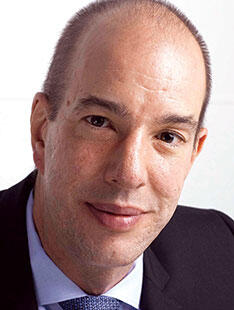Q&A: Anthony Romero ’87, Louder Than Words
The ACLU takes action to preserve liberty for all

Anthony Romero ’87 became executive director of the American Civil Liberties Union just a few days before the 9/11 attacks, but he probably never has been busier than since the election of President Donald Trump last November. He spoke with PAW about current challenges to civil liberties and his hopes for the future.
Has the ACLU attracted many new members?
Our membership has more than quadrupled since the election, and they are not just Democrats or progressives. Many establishment Republicans and libertarians have joined as well. People are paying attention, they realize this is a moment of enormous challenge for civil liberties, and they want to be part of a solution. It’s one of the most encouraging parts of this moment.
Has the Trump administration so far confirmed your fears?
Yes. The ACLU took Donald Trump both literally and seriously. We called him a one-man constitutional crisis, and so far, it looks as though he is going to fulfill that prediction.
How do you respond to criticism that the ACLU has been tougher on Trump than on Barack Obama?
There were some areas, like racial justice and voting rights, where our views coincided with the Obama administration. And President Obama ultimately came around in supporting LGBTQ rights. But when he was not fulfilling his campaign promise to close Guantánamo, we took out a full-page ad in The New York Times saying, “Mr. President, what is it going to be? Change or more of the same?” We hit him hard on the use of drones and the NSA surveillance program.
That is the special role of the ACLU, to serve as watchdog no matter who is president.
How do you justify representing unsavory views?
Our responsibility is to ensure that everyone’s rights are respected, and that includes individuals with whom we fundamentally disagree and those whose ideology we find loathsome.
So when Khalid Sheikh Mohammed was charged with masterminding the 9/11 attacks and was tried by a jerry-rigged military commission, we came to his defense. We represented Fred Phelps, the pastor of the Westboro Baptist Church, who organized loathsome protests at military funerals saying that the reason men and women in uniform were dying is because we grant gays civil rights. We fundamentally disagreed with his point of view, and yet when local officials tried to stop his lawful protests, we came to his defense.
Are you concerned about political correctness on the left, as well?
We recently came to the defense of Milos Yiannopoulos, the conservative blogger, after his speech was canceled by UC–Berkeley. It’s incredibly troubling when we see what is playing out in liberal-arts institutions that are supposed to be icons of freedom of speech and dissent. The efforts on some campuses, where there are trigger alerts and microaggression warnings, or professors feel as though they are walking on eggshells when they teach controversial subject matter — these things are anathema to a college education. College is exactly the time to engage viewpoints that challenge one’s own.
Are you optimistic about the future?
I think we might be entering the golden age of citizen activism, of government accountability, of engagement of individuals in the political and policy processes. It has been pretty remarkable, everything from the women’s marches to the protests against the Muslim ban to the activism [aimed at] ensuring that the Affordable Care Act was retained. If we are to harness that energy, and deploy and sustain it, perhaps we will come into a moment where there is much more vigorous policy debate and citizen engagement. That’s the hope. That’s the promise.
Interview conducted and condensed by Mark F. Bernstein ’83











No responses yet